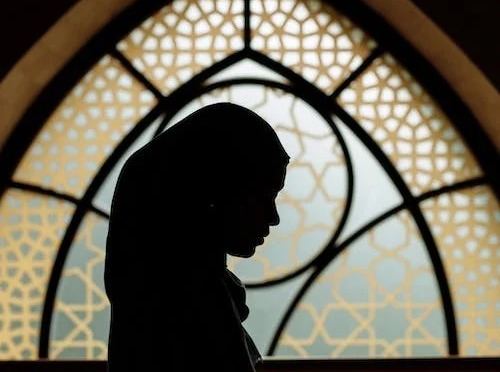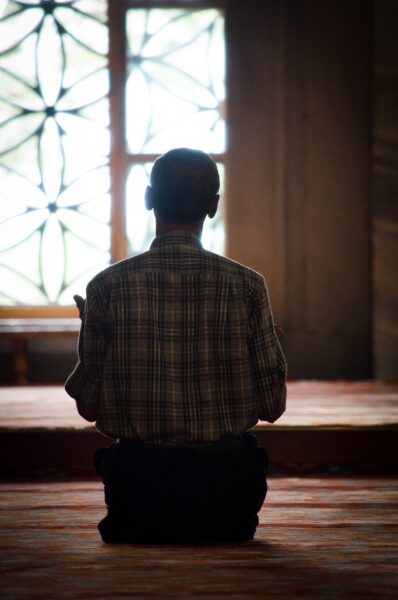Grief takes many forms. It’s not a one-size fits all, and there’s no correct way to experience it. You may go through it for many reasons. Often related to the loss of someone, but it can be related to the loss of other things such as the loss of a passed you, a career, a connection or even a home. It’s the feeling of longing, an empty void and a broken heart.
Grief Awareness Week falls in the Winter season which can create more Winter blues. That’s why we’re looking at how we’re able to care for ourselves during a period of grief – be it your own personal grief or what’s consumed the attention of the entire Ummah, namely the heart-wrenching situation in Palestine. Our hearts are mourning, and our souls crushed. We feel mixed emotions of intense grief and guilt. Grief because of the loss of lives, injustice and destruction; but also, guilt because we feel like we’re not doing or saying enough.
1. Accepting your grief
The feeling of guilt but can be all consuming, or at times dull. It doesn’t always have to be crashing, but instead a lingering feeling that stays. It’s difficult to accept that you’re grieving, because the acceptance of grief makes it more real, and this can be hard to stomach.
It’s normal to feel a range of emotions, and it’s about giving yourself permission to experience them. That’s ultimately the first step towards healing.
2. Talk about it
As simple as it sounds, dealing with grief can be a lonely place. It can feel as though you’re the only one going through it when there’s hundreds of humans you interact with daily that have experienced the emotion. However, some of us bottle this feeling up, until it spills out.
There’s no weakness in talking about how you’re feeling. Share your thoughts in a safe space with people you trust, and you may help others open up also. Particularly in relation to Palestine, many of us are trying to continue to fulfil the responsibilities of our day-to-day lives whilst our minds and hearts are occupied with the haunting images and videos we see. Others are also feeling this way, speaking up on it can make you and others feel heard and seen.
3. Be compassionate
The level of compassion you would show your friends if they were experiencing these emotions, is the level you too deserve. We’re often harsher to ourselves than we are to our loved ones. We may not be as patient or attentive, but you’re the most deserving of your own care.
Take breaks throughout the day, get involved in activities that bring you joy and prioritise self-care. Here’s some ways you can practice self-care this Winter.

4. Find ways to remember
Sometimes when you try to push a thought away, it comes back flooding. This can relate to dealing with the grief of a loved one. It’s important to remind ourselves that it’s okay to remember them, and you shouldn’t feel guilty for doing so. Moreover, as Muslims, we’re encouraged to make du’a for those who have passed or are suffering, and give Sadaqah Jariyah on their behalf.
This is beneficial for them, and an assurance for us that we’re remembering them, even as they’ve passed on. You can also talk about them with your loved ones, share your greatest stories. Embodying their good actions and character is also a way to help them earn rewards, as they are getting the benefit of teaching you a good deed.
For those who are still amongst us, but suffering around the globe, giving charity is one of the ways we can actively make a difference, when we feel helpless.
5. Get comfort from your Creator
The ache of grief is unique and personal to us all. It’s one of life’s hardest experiences and turns your life upside down. The pain may remain, but there’s comfort for us as believers that our Lord knows all that we bear – and He does not burden a soul with more than it can withstand. The weight you carry, the tears you shed, and the heart you try and heal is all known to Him. He Sees and Hears your struggle. It’s written down, and you are rewarded for every hardship you struggle through.

Seek comfort in the knowledge that He is aware, and would only test you with what you handle. Seek His help in dua, spend nights in prayer and call out to Him.
The Prophet (saw) specifically informed us, “Winter is the best season for the believer. Its nights are long for him to pray in.” We’re blessed to be in days where we can get into the habit of tahajud and find solace with our Lord.
The early generations used to spend these cold nights, weeping. Saʿid al-Kalbi (rahimahullah) said when, asked about this, “I thought about the poor amongst the Ummah of Muḥammad (saw) during this night, and I cried out of compassion for them.”
Whether you’re making du’a for your own struggles or channelling your outrage and pain for those suffering by calling out to Him, Allah is always there and listening to your plea.
You too can show compassion for the Ummah in these cold Winter nights.
6. Get professional support
Getting assistance from a mental health professional can be extremely beneficial. A therapist, counsellor or even support groups for grief can provide guidance, and a safe space for you to process your feelings.
You can contact a support organisation such as Cruse Bereavement Care or call: 0808 808 1677
If you would like to speak to a Muslim Bereavement Service, then contact Sakoon. An Islamic counselor can help you process your dealings with loss, and provide an Islamic perspective on death. You can find a number of Muslim therapists who help you work through your bereavement here
The Muslim Bereavement Support Service is a registered charity, founded in 2012. They offer face-to-face and telephone support in multiple languages and supporting literature. You can contact them at: 0800 211 8569 or email at [email protected].
Children of Jannah offer a range of specialist bereavement support services designed to help bereaved parents cope with their grief. Visit their website for more information here.
You can consider peer support, where people use their experiences to help each other. Find out more about peer support on the Mind website.